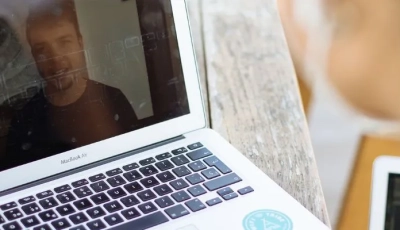Whether you’re a digital nomad out traveling the world, or a telecommuter based somewhere other than your usual place of residence, you’re likely to have encountered some of the following problems in the past:
- You find it difficult to establish lasting friendships and have to deal with being alone every time you move to a new location.
- If you have a family and you want them to be part of your remote-working adventure (something that’s now considerably easier thanks to the Start-up Law), you can’t because:
- Many types of accommodation are not designed for more than one or two people per room (as with coliving, for example);
- Suitable options like vacation rentals are too expensive for longer stays (for a whole school year, for instance) or require you to sign up to a contract of at least one year, as tends to be the case with traditional rentals;
- You may not have your own kitchen or bathroom (both of which are essential for families, as anyone who has children will tell you); and
- In most cases, children aren’t even allowed in certain types of accommodation, due to the fear of disruption for other digital nomads and remote workers.
But …
What if I told you there’s a form of communal living that’s also family-friendly? It’s called “cohousing,” and although the concept has been around for decades, it’s now seeing something of a renaissance as the ideal choice for discerning remote workers with certain considerations.
Would you like to find out more about cohousing and the benefits of this type of accommodation?
Let’s take a closer look! 💪

Cohousing Explained: From Hippie Philosophy to Professional Flexibility
The idea of cohousing (collaborative housing) emerged in Denmark more than 50 years ago. The original aims of this movement were to:
- Create a new form of communal living (in line with the hippie communes of the 1960s);
- Strengthen community ties;
- Encourage families to support each other by creating a housing model with private and shared spaces; and
- Ensure a more economically and ecologically sustainable way of living by pooling all common expenses and being more efficient in the use of resources.
But, besides a philosophy of communal living, what exactly is cohousing?
On a very basic level, cohousing involves a property with various units. Each unit has some private spaces, such as a kitchen, bathroom, and living room, but at the same time, the cohousing community will also share certain spaces. These might include a garden with swings for children, a swimming pool, a terrace with a barbecue, a laundry, a gym, or even a coworking space.
It’s important to make the distinction here between a cohousing community and an ordinary community of neighbors. People may well be neighbors on the same street or in a shared apartment block, but this doesn’t mean people or families will go out of their way to interact or support each other. In fact, people will often not know their neighbors at all despite having lived in the same place for years.
In the case of cohousing, on the other hand, the property is designed to create a connection between the people who make up the community, while still affording them a certain degree of privacy.
In addition, Internet, electricity, water, and other costs are shared, and there are even programs of communal activities, such as weekly meetings, lunches, get-togethers, and parties.
So, how does all this fit in with the lifestyle of remote workers and digital nomads?
The Benefits of Cohousing for Digital Nomads and Remote Workers
Freedom and Flexibility
If there’s one thing digital nomads want, it’s the freedom and flexibility to be able to uproot and head to a new destination, whenever they choose. Cohousing is ideal in this respect, as you don’t have to rent accommodation with an annual contract.

Families, Singles – All Are Welcome
Cohousing enables telecommuters and freelance digital nomads to travel with their families, since many residences offer plenty of space and have several rooms (including a bathroom and a private kitchen). That said, cohousing also suits nomads traveling alone, as they can also benefit from this type of cheerful, family-style environment.
A Cost-Efficient Alternative
Depending on the type of accommodation you choose, life as a digital nomad can be quite expensive.
- Hotels are only an option if you’re staying for a few days, and they don’t provide the support of the nomad community or a suitable place to work.
- Vacation rentals are prohibitively expensive if you plan to stay for more than a week, and the experience is more or less the same as staying in a hotel (but with even fewer amenities).
- Coliving is more affordable (and we at Repeople recommend it), but it’s not the option for you if you want to travel with your family – or if you’d prefer to have your own kitchen.
- And finally, traditional rentals aren’t suitable either, as they require long-term contracts.
Cohousing may be the answer you’re looking for: there’s the option of medium-term rentals, and expenses such as water, electricity, and high-speed Internet (always essential for remote working) are pooled and included in the final price, all of which can help you keep costs down.
We’re Opening a New Cohousing Residence: Cohousing Panamá, 79 – Las Palmas de Gran Canaria
Repeople is the largest community of digital nomads in the Canary Islands, and now, we’re proud to announce the opening of a new cohousing space on Gran Canaria: Cohousing Panamá, 79.
In the heart of Las Palmas de Gran Canaria, a stone’s throw from Las Canteras beach and less than a 15-minute walk from our coworking space, our new cohousing property is designed to accommodate solo remote workers and families alike.
There are six units in total, each decorated in a modern, minimalist style and featuring a kitchen and private bathroom. There’s also a garage and a communal floor with a shared kitchen and dining room, a living room, and a work area, so you have everything you need to relax, socialize, or work on your latest project.
If you have any questions, just get in touch using the form below – we’ll be happy to help.
Freedom, flexibility, and a ready-made community – you can have it all on Gran Canaria.
See you soon! 🙂





